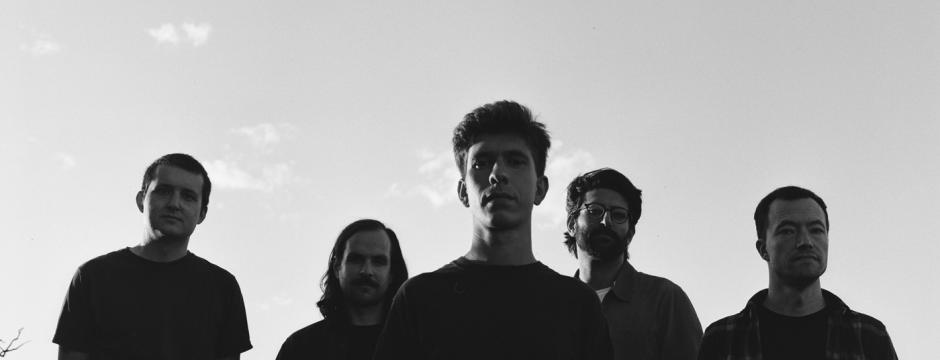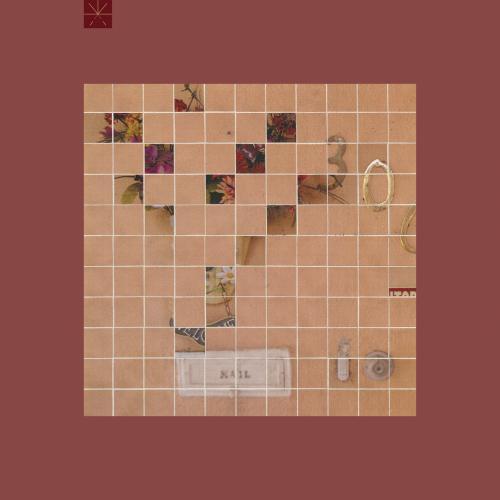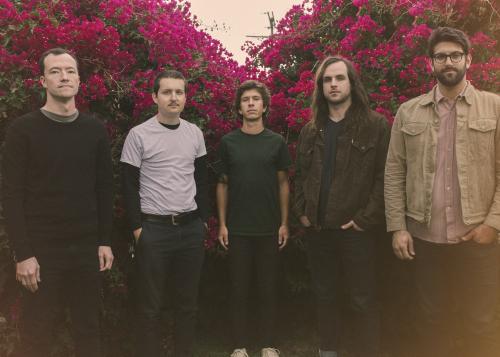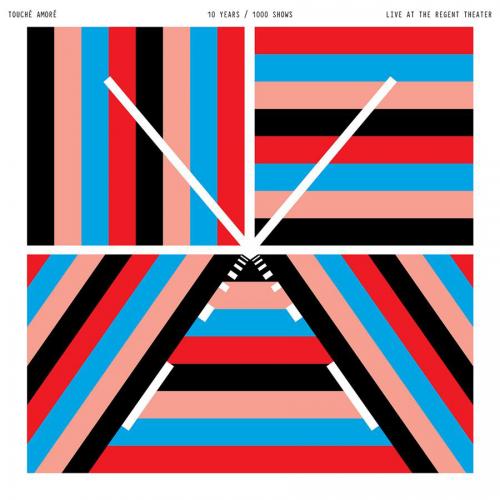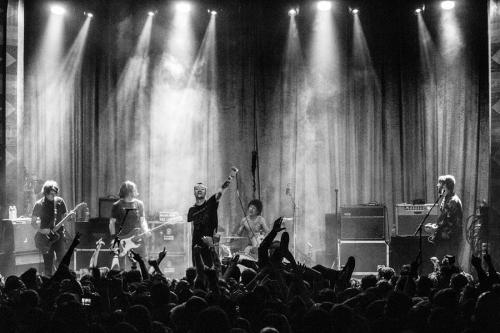Band: TOUCHÉ AMORÉ
Album: Lament
VÖ: 09.10.2020
Label: Epitaph/Indigo
Website: http://www.toucheamore.com/
Touché Amoré has been burrowing through angst, alienation, cancer, and death throughout four adored studio albums. After over a decade of working through darkness, the band’s gorgeously gruff fifth album, Lament, finds the light at the end of the tunnel. Through 11 songs, Touché Amoré looks back at its past and uses hard-won optimism to point its fans toward light, and love.
Last year, the Los Angeles quintet re-recorded its 2009 debut, ...To the Beat of a Dead Horse, to celebrate the decade gone by. It was a straightforward reflection of a time when the band’s songs rarely surpassed the two-minute mark and hooks were accidental if existent. A striking contrast to the band in 2020, as their evolution with every step in their oeuvre has lead to this moment. Lament is their masterstroke. Its longer, structured songs soar with a ferocious but delicate musicality and powerful, gut-wrenching storytelling that smashes previous heights. Yet as much as the band has grown and matured via everything they’ve endured, it’s perhaps equally impressive how they’ve managed to stay true to their core…
“I’ve always stood by the idea that if you’re gonna raise your voice and you’re gonna yell,” Bolm says, “and somebody is kind enough to listen to you do that—then I would not half-ass anything. I would be as honest as I possible"
The band’s critically acclaimed 2016 release, Stage Four, found Bolm mourning and paying tribute to his late mother, which in turn, challenged his emotional bandwidth to converse with an upswell of fans responding with their own stories of grief. Along with the duty of being empathetic, the band had to deal with their own lives. Personal relationships bloom, members’ families change either by marriage or fractured bonds. A new president takes office, and personal turmoil turns political.
“I sort of look at this record as a companion piece to Stage Four, in the sense that I’m not writing songs about [my mom] anymore,” Bolm says. “But the songs on this record are about what my life’s been like since doing that.”
Lament captures all of this. A widescreen view at the constant fragility we face as people, as well as, life-after-jarring-trauma that we all must endure at some time or another.
After 10 years together, the band have developed a family-like bond that has enabled them to withstand it all. “When you play music with people for this long, you can kind of anticipate their moves,” Steinhardt says. “If I’m writing a song or thinking of a drumbeat, I’m subconsciously thinking of something that [drummer] Elliot Babin would play.”
Lament marks a number of milestones for the post-hardcore rockers. For one, Nick Steinhardt gets to try out his newly learned pedal steel skills on album centerpiece “Limelight.” Four years is also the longest wait between studio albums, but the bandmates found they were still in-sync.
After working with Brad Wood for its past two efforts, Touché Amoré sought to break out of the proverbial comfort zone and get the famously demanding Ross Robinson (Slipknot, Korn, At the Drive-In). Both Robinson and Touché Amoré are known for their trademark intensity, which caused some hesitancy for Bolm. Ultimately, Robinson agreed to a rare one-song “test recording” last summer, which resulted in the song “Deflector,” released last fall. While Bolm remembers how Wood felt almost like a member of the band, he didn’t immediately find a mensch in Robinson. Getting out of the comfort zone clashed with straight-up being uncomfortable. Robinson made Bolm read out all of his confessional lyrics to his bandmates to make sure they understood their emotional content. He also invaded personal space by standing directly next to Bolm in the vocal booth as he sang. Those, along with his other abrasive, hands-on methods, took some getting used to.
“I believe there was an unspoken learning curve between Ross’s methods and the understanding that I’ve poured myself into the words and mean every one of them,” Bolm says.
In the end, “Deflector” proved the producer/band combo was undoubtedly the right fit; making Bolm read those lyrics turned out to be what helped make their emotions palpable in the final recording. With its ruminations on the draining human connection (“I'll test the water/I won't dive right in/That's too personal/I'm too delicate”), Lament’s first helping is a sharp intro to the album’s themes.
The emotional frankness on which Touché Amoré (“Touch Love”) stakes its bilingual name makes itself apparent across the entirety of Lament. Bolm has grown from his roots as hardcore kid traveling the world in a van to finding comfort in his longtime partner. As described in the album’s blazing opener “Come Heroine,” where Bolm publicly declares love and emits this confession: “From peaks of blue/Come heroine /With open arms you brought down the walls I defend.”
It’s on “I’ll Be Your Host,” where Bolm, amid the jangling guitar, grapples with the aforementioned mounting uneasiness that comes with having to connect to fans’ pain. With its acerbic slogans (“Pin a black ribbon on/We’re the mourning campaign/I didn’t ask to lead this party/I explain”), Touché Amoré cuts right through the complexities of being a vehicle for grief as its driver tries to maintain his sanity. In the vein of Bright Eyes’ poetic blend of political and personal insight, “Reminders” captures Touché Amoré trying to find some respite amid the constant stream of President Trump’s failings.
Perhaps Lament’s biggest point is that Touché Amoré are still human. On “Limelight,” the solemn guitar plucks work almost as a solace for Bolm as he works through the deaths of his beloved dogs over the past two years and an understandable outward cynicism. The song also finds him praising his partner for supporting him through it all, and the overwhelming feeling becomes one of hope. “So let’s embrace the twilight/While burning out the limelight,” he shouts against the climaxing chords. He may still be broken but he’s trying, as we all are.
The album’s closer ties it all together, as “A Forecast” is fittingly a precise update on Bolm’s life. He speaks to the listener as an old friend, perhaps because they are. Where he professes not feeling supported when he needed it most by those he figured would care the most. Mentions his new found love for Jazz, an obsession for the Coen Brothers… Before the song ends, he admits “I’m not sure what I’m after/but it couldn’t go left unsaid.” The album ends with the confession “I’m still out in the rain/I could use a little shelter/now and then.”
Ultimately, the message from Lament? Bolm sums it up best: “That time doesn’t heal. That love can nurture. That it’s okay to not be okay.”
Jeremy Bolm (vocals) - Nick Steinhardt (guitar) - Clayton Stevens (guitar) – Tyler Kirby (bass) - Elliot Babin (drums)
Infos zur vorherigen VÖ:
On February 16, Touché Amoré played their 1000th show at The Regent Theater in the band’s hometown of Los Angeles to celebrate their 10-year anniversary as a band. The recording of the sold out show will be released as a live album entitled 10 Years / 1000 Shows - Live at The Regent Theater on November 2 via Epitaph.
10 Years / 1000 Shows Live at The Regent Theater features 27 live recorded tracks that were mixed by Kurt Ballou at GodCity Studio in Salem, MA.
In late 2016 Touché Amoré released their fourth studio album, Stage Four. The album Stage Four graced many “Best of 2016” lists including A.V. Club’s “20 Best Albums of 2016” list, Stereogum’s “50 Best Albums Of 2016” list, one of the year’s best L.A. albums by L.A. Weekly, and one of the 20 best emo/punk albums of 2016 by Brooklyn Vegan. In addition, Apple Music ranked the Stage Four single “Palm Dreams” among the Best Rock Tracks and Best Hard Rock Songs of 2016.
Touche Amore 10 Years / 1000 Shows Live At The Regent Theater Track List
1. ~
2. New Halloween
3. Rapture
4. And Now It’s Happening In Mine
5. Uppers / Downers
6. Adieux
7. Steps
8. Just Exist
9. Pathfinder
10. Flowers And You
11. Negotiating The Charade
12. The Great Repetition
13. Art Official
14. Displacement
15. Cadence
16. Harbor
17. Palm Dreams
18. Home Away From Here
19. Amends
20. Banter
21. Benediction
22. Is Survived By
23. Condolences
24. Banter
25. Circa 95
26. Low Beams
27. I’ll Get My Just Deserve
28. I’ll Deserve Just That
29. Honest Sleep
Stage Four Bio:
Band: Touché Amoré
Album: Stage Four
VÖ: 16.09.2016
Label: Epitaph Records / Indigo
Website: www.toucheamore.com
Stage Four is the new album from the Los Angeles band Touché Amoré, and its title is an emblem of a band both living its dream and marred by loss.
Formed in Burbank, California, across 2007 and 2008, the band’s urgent sound, with its melodic sonic assault and impassioned vocals, has grown tighter and more refined through a trio of full-length albums and a series of EP’s and releases. Since those early days, lead singer Jeremy Bolm, guitarists Nick Steinhardt and Clayton Stevens, bassist Tyler Kirby, and drummer Elliot Babin have created a trajectory for themselves through hard work and dedication. And now with Stage Four, their fourth and biggest album to date, they are cementing their status as one of punk music’s most talented, relatable, and visceral acts.
Rising to prominence in the hardcore community through releases on notable labels like No Sleep, 6131, and Deathwish, and on albums like 2009’s …To the Beat of a Dead Horse and 2011’s Parting the Sea Between Brightness and Me, Touché Amoré crossed into new territory with the 2013 art-punk masterpiece Is Survived By. Having earned early cred, critical favor, and legions of fans by playing lengthy tours of all shapes and sizes—in every basement, youth center, and house show on the circuit but also on large stages alongside bands like Thursday and mewithoutyou, AFI, Rise Against and with touring festivals—the band enjoyed a bigger following which only grew along with their talents.
“I don’t open up to people too much in regular life, but when I’m writing songs, I want to be as open and as honest as possible,” Bolm confesses, but, having surpassed every expectation of which any of the bandmates could have dreamed, he eventually found it difficult to cull lyrical material to satisfy their impressive ascendance. “I feel that on the timeline of a band’s path, it gets really hard with each subsequent record,” Bolm says. “At the point where we started writing Is Survived By, I was in such a good place it was hard to find anything to write about. I hit that wall. I had an awesome girl at home, I wasn’t drowning in debt, I had this band. I’d just turned 30 so I looked at it as writing about who I am, what I can be, how I’ll be remembered after I go and if I’ll make a positive impact. It was basically a big self-reflection. I wanted to find that middle ground of writing music that’s ‘us’ but not drifting too far to alienate people. We knocked that record out.”
Steinhardt, the band’s guitarist—and original bassist—who stills maintains his side career as a graphic designer working on pop album art, sees a similar flight in the evolution of their sound. “When Touché started, it was a much more aggressive band,” he says. “It was more angsty on all counts. In essence, we are a hardcore punk band. The songs are fast, they’ve got a lot of energy, they’re mostly yelling. But the sound of that isn’t tough; it’s not ultra-distorted. We all play Fenders and it’s very twangy. I hear the American, top-heavy, jangly, upbeat sound. And everyone can relate to Jeremy because they can actually understand what he’s screaming. His voice is not nearly as abrasive as most screamers. He has this huge gift for lyrics, it’s very honest, and he’s talking about these extremely personal situations but in a way that everyone can relate. That’s a huge entry point for our band.”
It was in the midst of Touché Amoré’s spot lit momentum in late 2013 that Bolm received the news that his mother had been diagnosed with Stage Four cancer. Having watched her fight and beat a form of the disease nearly twenty years earlier, Bolm was devastated by its return, which doctors explained was fully metastasized and gave her three months to a year to live.
“I was still living with my mom at home and helping her with what I could,” Bolm says. “I took her to so many doctor appointments for different MRIs. She didn’t ask for a lot. She’s a very proud woman. But there was a lot of waiting.” Experiencing the agonizing dilemma of caring for his ailing mother while potentially prohibiting the growth of his band’s career during their biggest moment, there was no easy solution. But Bolm found courage in his mother’s fight, and looked to an early memory of her love and support to help him come to terms with what he had to do.
“There was a night early on in our history when Touché played the Troubadour and all of our families came to see us play,” Bolm says. “After that, my mom and my brother pulled me aside and told me to keep doing this. From there they became our biggest supporters. So for her, me being home meant that I wasn’t the guy in the band.
“So as we were talking as a band about these tour opportunities, everyone was saying, ‘We don’t have to do anything; we’ll cancel everything, take care of your mom,’ I go to her and tell her I’m in this really hard position: ‘I want to be here with you, but this affects everyone’s wallets and well-being.’ My mom said, ‘What are you gonna do if you’re home? You’re gonna hang out with me a couple hours a day and then what? Just go.’”
Even with his mother’s command, leaving for tour was no small feat, and Bolm checked in on her constantly, getting continuous updates from his brother at home while Touché was on the road. But as his emotions continued to conflict, he learned to find solace in his music. “I think I felt relief,” Bolms says of playing those shows. “It’s really hard watching your parent start dissolving like that. I think I used tour as an excuse to shy away from it. I knew my brother was there with her, and if anything went south, I’d be on a plane regardless of the scenario. I felt pretty safe with it. In February 2014, we did a co-headlining tour with mewithoutyou and that was the last time she saw me play.”
Throughout her fight, Bolm found never-failing strength from his mother, who had become his biggest source of encouragement and inspiration. Just before Halloween 2014, after Touché had returned from an Asian tour, his mother’s health took a turn for the worse, leaving Bolm with the impossible decision of whether or not to cancel the band’s final show of the year in Gainesville, Florida, and stay by her side, or to board the plane, play the set, and return to California. His mother encouraged him to go, to continue living his dream: “She would say, ‘This is what you do. Play the stupid show.’” And so he did.
“We get onstage in Florida that night, on Halloween, and play our set,” he says. “It was a good way to get all that out. I get offstage and look at my phone and see a text from my brother saying, ‘Give me a call when you get the chance.’ I knew. I put off the call for a while. I went to sell merch and talk with friends. I gave it an hour and a half then called my brother. It’s crazy to think it happened while we were playing. We went home on the scheduled flight the next day.”
The next months for Bolm would be filled with the both the emotional and logistical sides of loss, from the devastating void in his life to the cremation and burial services to the hyper-emotional chore of cleaning out his mother’s house. (“I would not put that on my worst enemy,” Bolm says. “It is the worst part.”) As time passed, the band’s friends and fans were made aware of the situation, a process that would prove helpful in many ways. As Steinhardt says, “Jeremy is the type of sharer that eventually people knew what had happened; I think he has found that sharing is a good avenue for him to grieve through.”
And so, when the time came to begin writing the fourth Touché Amoré album, there was no question for Bolm as to what the story of the record would be. Taking influence from other songs about grief written in genres across the board—from Sun Kil Moon to Death Cab for Cutie—Bolm learned to focus on specific moments in life and in lyrics. “This has been an event in my life where I’ve heard so many things differently that maybe didn’t click before, but now they do in a way that I can get near it,” Bolm says. “I don’t open up to people too much in regular life, but when I’m writing songs, I want to be as open and as honest as possible. We started writing and I immediately knew the subject. In a fucked up way, I had said I didn’t know what to write about anymore, and now here’s this. I told the guys early on that this record would be about my mom. We always write the music first, but I wanted to wait until we had at least four or five songs done before I start opening the floodgates.” In early 2016 the band entered the studio with producer Brad Wood in Studio City to begin recording Stage Four.
Musically, the band recognizes that their writing process this time around was also a little different, due in part to Steinhardt rediscovering his love for guitar rock, and being more observant of song structures and how musical phrases work together in the old less-is-more maxim. Encouraged endlessly by Bolm to stand out from their peers in a tried-and-true genre, the band pushed themselves to elevate their songwriting and to satisfy their desire to excel and evolve.
Stage Four’s first single is the catchy “Palm Dreams,” and it’s instantly clear from Bolm’s vocals that Touché Amoré is breaking new ground: the career screamer is actually singing, in a quite capable sing-speak harmony. Here he describes an analogy of the very real place he and his mother discovered together behind the glamor and superficiality most expect from Los Angeles. As Steinhardt says, the song was written from a riff sent to him by Stevens that he then built around, adding layers of aggressive guitar with hooky elements. “Jeremy said it sounds like a ‘pissed off Cure,’” he says.
“New Halloween” is another heavier number, but disguises its roughness with an upbeat tempo and serves as a more welcoming standard. “Rapture” is driven by Babin’s propulsive drumming and Kirby’s powerful bass lines, and exemplifies the more art rock side of Touché. “Water Damage” is a contrast in dynamics and ends with a tight breakdown and Bolm’s chilling refrain: “The words they echo over and over/ When you leaned in and said ‘We both know what this is’ / And I haven’t recovered since.”
The final track, the lush, jangly “Skyscraper,” featuring haunting guest vocals from Julien Baker, ends the album with an atmospheric departure, both sonically and in spirit. As the song builds into a hanging cacophony over wails, chiming guitar, pounding drums, and ambient tones, a voicemail recording enters the fray. It is the final message left for Bolm by his mother, a simple verbal note that has taken on a new weight and significance given its gravity. The inclusion of something so deeply personal in such a public format exemplifies the open, all-in nature of Bolm and of Touché Amoré, and succeeds in connecting listener to band in a way never before imaginable.
The last step of Stage Four was the album’s cover and interior art (created by collage artist Anthony Gerace), which the band left to their resident pro, Steinhardt. Finding poignant inspiration in the extreme emotional challenge Bolm experienced while packing up his mother’s belongings left behind in her home, Steinhardt—with the help of a collage artist from the UK—documented the house in a unique and touching before-and-after book; first, as it had been while Bolm was still living within its walls, and then again after he’d removed everything following his mother’s passing. “The album’s front cover is the front of the house, and the rest of the art is as if you’re driving up to their street,” Steinhardt says. “It’s the visual story of before and after.”
What is past is prologue, as they say. And with such emotional heaviness, the pressure of expectations, and hardest parts of their career behind them, Touché Amoré can now draw from those experiences and surge forward with what is unmistakably the biggest, boldest, and most artistic statement of their career.
“With the fourth record, the pressures are less on you because you’ve proven yourself,” Bolm says. “If you’ve got enough people on board at this point that are still interested, they’re going to take the ride with you wherever you choose to go. With this record being so heavy, content-wise, I also think it’s our catchiest. I never sang before, so I took a chance with that. I’m so thankful that everybody involved has been so supportive and delicate with the subject matter.”
